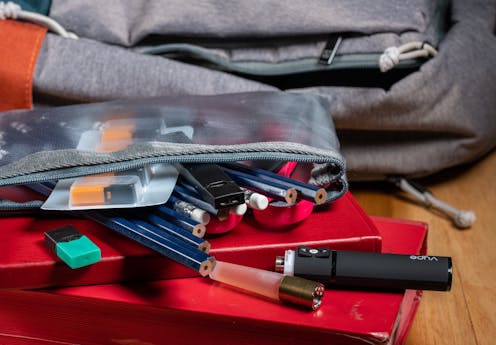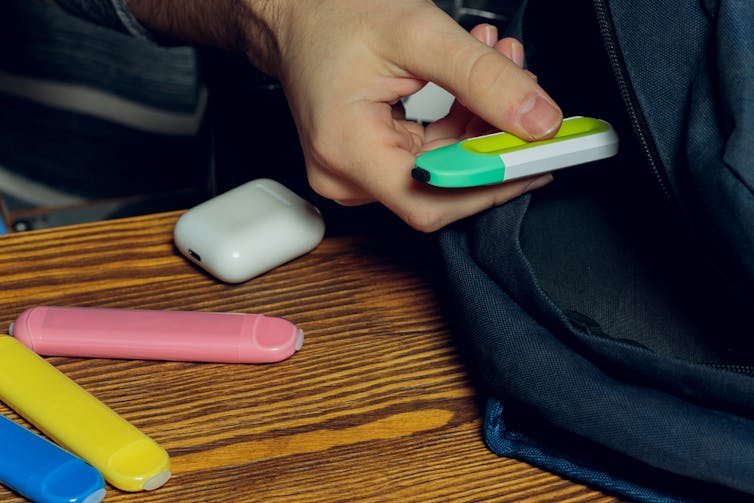Source: The Conversation (Au and NZ) – By Becky Freeman, Associate Professor, School of Public Health, University of Sydney

Shutterstock
In a major speech today, Federal Health Minister Mark Butler said vaping has become “the number one behavioural issue in high schools”.
The government today proposed a suite of reforms aimed at reducing vaping.
But what does the evidence show about the prevalence of vaping in schools and the kind of behavioural issues associated with it?
My colleagues and I have been researching teen vape use through the Generation Vape study. We’ve been tracking teenagers’ knowledge, attitudes, beliefs and behaviours about using vapes (also known as e-cigarettes).
This has involved interviewing and surveying young people across Australia aged 13–17, their parents and carers and secondary school teachers, principals and administrators.
Here’s what we know so far.
How prevalent is vaping in high schools?
Of the 721 young people we have surveyed so far:
-
32% had ever vaped (we call these people “ever-vapers”)
-
54% of ever-vapers had never smoked cigarettes before starting vaping
-
ever-smokers were seven times more likely to be ever-vapers than those who had never smoked (in other words, young people who have tried smoking are much more likely to have tried vaping)
-
ever-vapers were 18 times more likely to be ever-smokers than those who had never vaped (in other words, young people who had ever tried vaping were significantly more likely to have ever tried smoking).
Most of our respondents said the main factor driving their vaping was flavouring and taste.
In other words, about one in three teenagers have tried vaping. Only a few years ago it was really rare, but it’s exploded in use.
We also asked about frequency of vaping. We found 10% typically used vapes on six or more days a month, but the fact that most are occasional users suggests we have a window of opportunity to act now before these people become addicted.
Occasional users told us they are trying vaping because they are curious, are interested in experiencing the hit from nicotine, and don’t imagine themselves getting addicted. Unfortunately, they often do find soon themselves addicted, which is why a public health response is so urgently needed.
Our data also shows:
-
more than half of those trying a vape for the first time are under age 16
-
more than half of ever-vapers reported using a vape they knew contained nicotine
-
vaping is seen as a socially acceptable behaviour separate and unique from smoking.
One 17-year-old ever-vaper told us “no-one” buys the non-nicotine devices
because they don’t give you head spins, so they are pointless. It’s almost like wasting money.
Another 17-year-old past vaper told us:
Oh, you can get ones without nicotine but I don’t think they’re very popular […] it tells you when you buy a vape how much nicotine’s in it. It’s usually 5%.

Shutterstock
What are teachers, principals and school administrators saying?
In our surveys and interviews with teachers, principals and school administrators, we found:
-
58% of teachers have confiscated vaping products from students two or more times a week
-
86% of teachers are concerned or very concerned about students vaping in their school
-
62% of teachers are aware of vaping products being sold on school grounds.
Teachers reported feeling they had to police students by searching bags and pencil cases, and that having to manage vaping as a disciplinary issue took time away from teaching.
Principals and school administrators talked about having to
-
use school funds to install vape detectors in school toilets
-
liaise with parents of children caught vaping
-
think about safety issues presented by people coming to the school gate to sell vapes to students.
If children are addicted, we don’t want to see them kicked out of school. It’s not their fault they have become addicted to these products. That’s why we need a public health response rather than a punitive response.
One principal told us:
it’s probably the single most disruptive thing in our school at the moment.
A different teacher said:
even when you catch them they deny to your face and then you have argue […]
it becomes a massive issue and 40 minutes of your life is taken away just with this
one thing when you should be doing other things as a teacher.
Another principal said:
We can bring it up with the kids as much as we want, but I think we need a little bit of traction there beyond school too.
What kind of behaviour issues are linked to vaping in school?
Teens who vape regularly reported:
-
experiencing nicotine withdrawal while at school, which can feel like anxiety or stress (many told us they vape for their mental health, not understanding the stress is linked to the addiction)
-
sneaking out of class to vape
-
feeling distracted and finding it difficult to focus in the classroom
-
feeling stressed about needing to hide their device and their vaping while at school.
One 17-year-old told us:
I’d see people at school […] at nine o’clock in the morning going, “Oh do you have a vape? Do you have a vape? I need one. I haven’t had one all day”, and begging people for it […] so I think it’s mostly an addiction thing with people who are heavy users.
What is the evidence telling us is needed?
The evidence tells us we really need to get these products out of the hands of young people. That’s why making them harder to buy is vital.
About 80% of our respondents told us it was easy to get vapes; it was common knowledge who sold them at school or that certain people would sell them by the school gate.
That’s why the importation ban in the government reforms is so important, and why it’s crucial states and territories work with the federal government to get vapes out of corner shops and petrol stations. It’s about reducing access so kids aren’t exposed to it as they are walking to school.
Is it really the number one behavioural issue in high school?
It’s impossible to say. But certainly the data is telling us it is a very big issue.
Of the teachers we surveyed, 86% said they were “highly concerned” about vaping at school. In interviews, teachers often described vaping as the key issue they are dealing with outside the classroom.
Schools have to deal with so many issues, so if we can reduce this one or even take it off their plate altogether then we should.
Read more:
We asked over 700 teens where they bought their vapes. Here’s what they said
![]()
Becky Freeman is an Expert Advisor to the Cancer Council Tobacco Issues Committee and a member of the Cancer Institute Vaping Communications Advisory Panel. These are unpaid roles. She has received relevant competitive grants that include a focus on e-cigarettes/vaping from the NHMRC, MRFF, NSW Health, the Ian Potter Foundation, VicHealth, and Healthway WA; relevant research contracts from the Cancer Institute NSW and the Cancer Council NSW; relevant personal/consulting fees from the World Health Organization, the Hong Kong Special Administrative Region Department of Health, BMJ Tobacco Control, the Heart Foundation NSW, the US FDA, the NHMRC e-cigarette working committee, NSW Health, and Cancer Council NSW; and relevant travel expenses from the Oceania Tobacco Control Conference and the Australia Public Health Association preventive health conference.
– ref. Vaping and behaviour in schools: what does the research tell us? – https://theconversation.com/vaping-and-behaviour-in-schools-what-does-the-research-tell-us-204794




